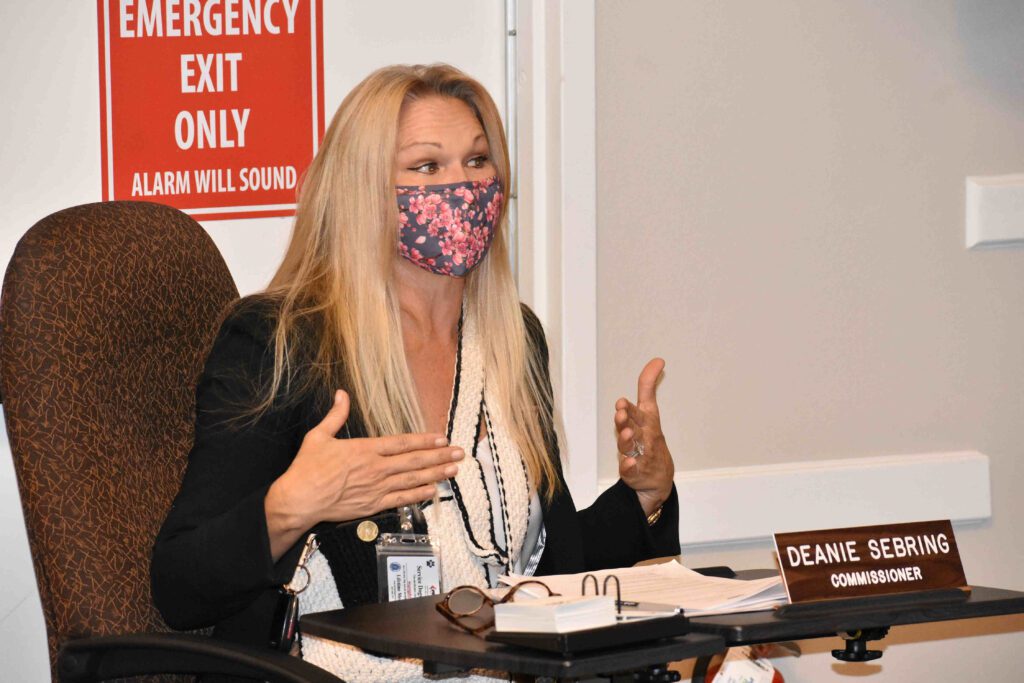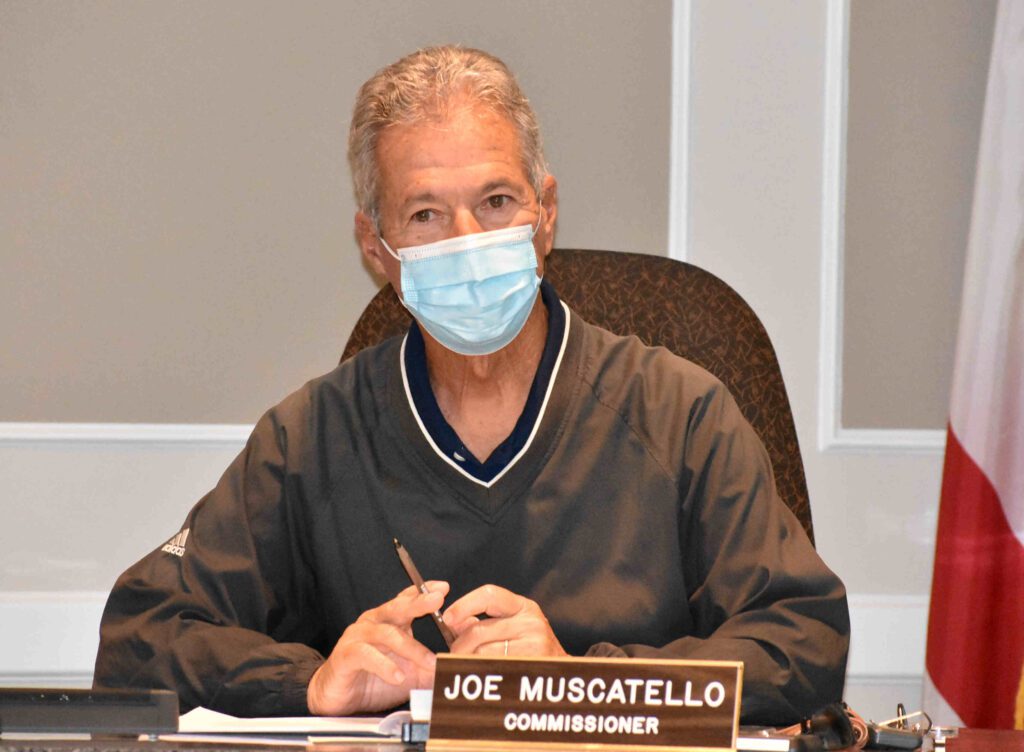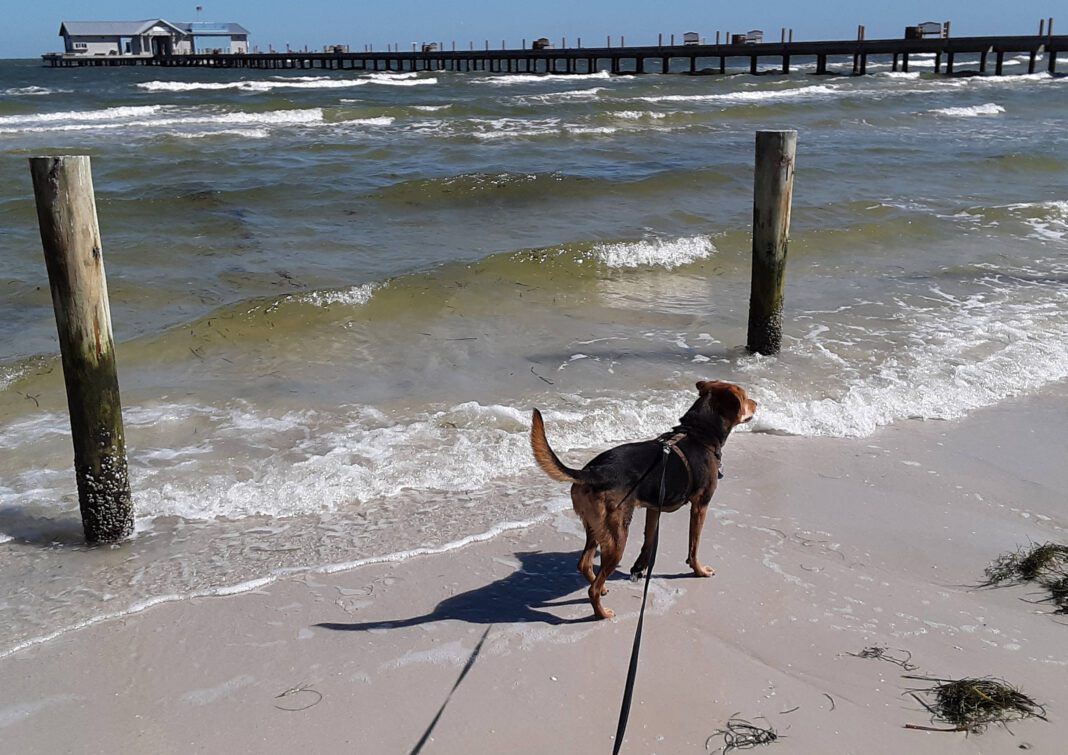ANNA MARIA – Dogs on the beach are a growing concern in Anna Maria.
City officials believe the steady stream of tourists, the lack of verification requirements for service dogs and dog-friendly sheriff’s deputies are contributing factors.
Mayor Dan Murphy initiated discussion on these topics during the Thursday, Jan. 28 city commission meeting. He told the commission he started getting more complaints about dogs on beaches in October and asked the Anna Maria Unit of the Manatee County Sheriff’s Office to increase its enforcement efforts.
“We get complaints, and the complaints are escalating,” Murphy said, noting they’re not all coming from the same people.
As a result of Thursday’s discussion, the city commission informally asked Murphy to put together a proposal detailing the potential cost of using code enforcement officers employed directly by the city to enforce the city’s dog-related regulations.
City ordinances
According to Sec. 38-28 of the city ordinances, “It shall be unlawful for the owner or keeper of any domestic animal to allow such animal on any beaches, coastal barrier sand dunes or parks located within the city limits.”
According to Murphy, this includes the beach at Bayfront Park and the public beach areas near the City Pier.
The ordinance does not prohibit keeping a domestic animal on private beach property, as long as it isn’t allowed to stray onto public beaches, coastal barrier sand dunes or parks.
According to Sec. 14-61, “The owner or custodian of a dog or cat must have direct control of such animal at all times.”
According to Sec. 14-62, “Any feces deposited by a dog or cat on public property, public walks, recreation areas or the private property of others must be immediately removed by the person who has custody or control of the animal, unless otherwise authorized by the property owner.”
Service dogs and photographs
When addressing the commission, Murphy said, “Part of the problem with this is if it’s a service dog there’s nothing that can be done about a dog on the beach. Under the law, the only thing that’s required is for the person to say it’s a service dog. It doesn’t have to have a license. You don’t have to have a little jacket on it. You don’t have to have anything. The word has gotten out, so everything’s a service dog.”
He then deferred to Commissioner Deanie Sebring, whose diabetic alert dog, Humphrey, she carries in a pouch worn around her chest and torso.

Sebring said the Americans with Disabilities Act (ADA) does not require the dog owner to carry a card or the dog to wear a vest that designates it as a service dog.
“They don’t want a disabled person to be singled out by your dog actually having a vest or a card,” Sebring said, noting that she carries such a card.
“The only way a service dog can be asked to leave is if it’s behaving in a manner that’s not acceptable. If the dog is behaving, there really is nothing that anyone can do about it. As far as comfort dogs, I believe that’s a whole different situation. But there again, it’s someone’s word the police officer has to take,” Sebring said.
Murphy said a new and additional complaint has also recently surfaced: He’s now getting complaints about sheriff’s deputies posing for photos with dogs on the beach, and he’s been asked what signal that sends to others.
“They must come to a conclusion that it’s OK to have a dog on the beach because they’re taking a picture with the deputy,” Murphy said.
Murphy said he discussed this with Anna Maria Unit leader Sgt. Brett Getman.
“He feels very strongly that the people are doing nothing wrong because it’s a service dog. And if they ask for a picture on the beach with a dog that’s just good public relations. My perspective is different than that. Perception becomes reality. If the perception is that we’re allowing dogs on the beach because we have a deputy having their picture taken with a dog, then to me that exacerbates it. I can pursue this further with the sheriff and see if we can have a change of heart in that regard, if that’s what the commission is interested in,” Murphy said.
Canine concerns
“There’s no bad dogs, there’s only bad people. And bad people don’t pick up their dog feces.” Commissioner Jon Crane said. “Dog feces is one of the two reasons you don’t want dogs on the beach. The other is they might bite people.”
Crane said he’s not in favor of deputies posing for photos with dogs on the beach, and he’d like to see the sheriff’s office take this entire matter more seriously, but he doesn’t want to pick a fight with the city’s contracted law enforcement agency.
“I wouldn’t mind tripling the fines for people that don’t pick up their dog poop,” he added.
Later in the discussion, Crane said, “I had an experience walking my dogs across the roadside edge of Bayfront Park, which I guess is wrong – I was told it is wrong by a sheriff’s deputy. They didn’t take a picture with me and they shooed me off of Bayfront Park. So, I don’t know how widespread this is, but they handled me appropriately.”
Commissioner Joe Muscatello asked about the fines for having a dog on the beach or not cleaning up after it. Murphy said he thought those fines were $500 and he noted the fine for not cleaning up after your dog applies anywhere in the city.

Muscatello noted Anna Maria beaches are considered bird and turtle sanctuaries: “If that’s what we’re going to be, then we need to stay true to that. We’re a special beach here and we need to maintain that.”
Crane said he’d like to see more enforcement of the city’s leash law, because a dog on a leash isn’t going to chase down a turtle or a seabird.
Raising another concern, Sebring said she often sees dogs “running amok” on the beach after coming off a boat: “I see them pulling up and they don’t put them on leashes. The dogs run up into the dunes and do whatever.”
Muscatello acknowledged it’s difficult to enforce dogs coming off boats, but he still expects the sheriff’s deputies to enforce the laws: “We need to make sure we’re not opening this up to be a kennel on the beach.”
COVID and costs
“We have some special issues this year with COVID,” Commission Chair Carol Carter said.
Carter said she’s seen social media posts about vacation rental guests bringing four dogs with them. She believes there are more dogs in Anna Maria now due to travelers driving instead of flying. She also said she hears more dogs barking and sees more dog feces on the ground when she’s out walking.
“I don’t think these are owners or residents with their dogs. I think these are visitors who don’t understand our rules. I would like to see us create a little more awareness than what’s being done by the sheriff,” Carter said.
“If the sheriff doesn’t want to take any further action, I think we ought to consider code enforcement helping with some of this. I’m really concerned about the number of dogs running around on the beach.” Carter said, noting that she loves dogs and has had one most of her life.
Muscatello asked if the vacation rental companies make their guests aware of the city regulations regarding dogs on the beach. Murphy said some do and some don’t. Murphy said that information could be added to the list of best practices already provided to vacation rental guests regarding sea turtle protections, beach lighting restrictions and other local regulations.
Sebring noted the only public beach near Anna Maria Island that allows dogs is off-Island, along the Palma Sola Causeway.
Murphy said if the commission wants to use code enforcement officers to patrol beaches, he could come back with a proposal that details the estimated costs.
“It’s going to take vehicles and it’s going to take more bodies – as long as you understand that up front. We’re going to need a vehicle that can go on the beach,” Murphy said.
“We have to defend this beach. If that’s what it takes, that’s what it takes,” Muscatello said.
































